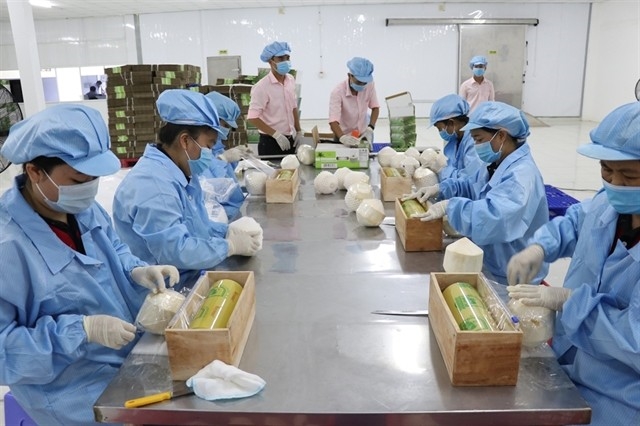Việt Nam sees many opportunities in coconut exports
Sunday, September 24,2023
AsemconnectVietnam - Việt Nam is optimistic about increasing its coconut exports as several countries are welcoming Vietnamese coconuts.
The US, Bangladesh, and Israel have opened their markets to fresh coconuts from Việt Nam. Additionally, Vietnamese durian products will not be subjected to quotas when exported to Japan and South Korea.
There's a possibility that China will soon officially permit the import of coconuts from Việt Nam.
These favourable shifts in the export markets are motivating coconut farmers to enhance their plantations and collaborate with enterprises to boost coconut exports.
Following the US' green light to import Vietnamese coconuts, Nguyễn Đình Tùng, the general director of Vina T&T Group Import-Export Company, reported that they have already shipped four containers of the fruit to the US market.
Tùng stated that Việt Nam possesses advanced preservation technology for coconuts, allowing the fruit to be transported over long distances. Being a clean fruit, coconuts have easier pest management compared to other fruits.
This means there's a reduced risk of breaching quarantine and food safety regulations. Tùng's company sources coconuts from primary cultivation areas in Bến Tre Province, ensuring a consistent supply of raw materials.
Similar to various other agricultural products, coconuts often experience the cycle of abundant harvests accompanied by low prices.
Nevertheless, with coconuts now being exported to numerous markets, notably the US, the domestic coconut market has seen increased vitality.
The successful export of fresh coconuts has positively impacted dried coconut prices, offering a more steady growth. The recent buying price for dried coconuts in Bến Tre has fluctuated between VNĐ70,000 and over VNĐ80,000 per dozen, containing 12 units of coconut. This is an increase of roughly VNĐ20,000 from four months prior, and about VNĐ50,000 since the start of the year.
Đặng Phúc Nguyên, the general secretary of the Việt Nam Fruit and Vegetable Association, posits that if China opens its market to Việt Nam's coconuts towards the end of this year or the beginning of the next, it's anticipated that fresh coconut consumption will surge in next year's summer.
Furthermore, businesses are looking forward to exporting a significant volume of processed coconut products, including dried coconut, coconut flesh, coconut milk, and coconut oil. These are intended for the winter market, providing a potential avenue for the coconut industry to achieve significant advancements in production and exports in the near future.
Currently, two-thirds of the exported coconuts are in processed form. If Việt Nam amplifies its fresh coconut exports, the overall value of coconut exports will rise, subsequently boosting the earnings of coconut growers. These are compelling reasons for farmers to further invest in coconut cultivation, as highlighted by Nguyên.
Cao Bá Đăng Khoa, the acting general secretary of the Việt Nam Coconut Association, notes that while the opening of international markets presents opportunities, it also introduces challenges for domestic enterprises. Not many businesses possess an export-focused mindset when it comes to coconuts.
“When having many export chances, the businesses will rush to invest in the production and export of coconut. Meanwhile, they do not have enough time to carefully research markets," said Khoa.
Khoa revealed that currently, only about 20 enterprises have invested methodically and conducted thorough research on the coconut market. Smaller firms often dive into exports without comprehensive market research, leading to potential significant price fluctuations in products, akin to the current situation with durian prices.
To meet the rigorous standards of discerning markets such as the US and Europe, as well as anticipated markets like China, numerous areas in the Mekong Delta have initiated training programmes for farmers. These programmes focus on cultivating coconuts suitable for export that adhere to international standards.
Huỳnh Quang Đức, deputy director of the Bến Tre Department of Agriculture and Rural Development, emphasised that coconut industry businesses should augment the export of high-value processed products. They ought to establish coded coconut cultivation zones that comply with GAP standards and promote organic production methods.
The province boasts various schemes centred on large-scale production in accordance with GAP and organic standards. Approximately 30 per cent of Bến Tre's coconut outputs undergo intensive processing for export purposes.
The Bến Tre Department of Agriculture and Rural Development projects a future focus on enhancing the synergy between businesses and farmers as well as fostering collaborations among farmers themselves.
Support will also be amplified for cooperatives to enhance their efficacy in structured production chains.
Furthermore, there's a push to collaborate with local entities and businesses to establish standards for raw material zones. A special emphasis is placed on fostering the growth of organic coconut cultivation areas.
In 2022, Việt Nam reported a coconut export turnover of US$700 million. This figure is projected to rise to approximately $1 billion by 2025, propelled by the US and China's decision to permit coconut imports from Việt Nam.
Source: Ven.vn/VNS
Shrimp exports to US and China recorded positive results
Trade revenue in August and first eight months of 2023
Good news for Vietnam’s tra fish exports to US
2 export items increased "billion dollars" in turnover in 8 months
DAILY: Vietnamese pepper prices remained unchanged on September 21
DAILY: Vietnamese coffee prices fell by 500 VND on September 21
Ministry projects three economic growth scenarios for 2024
Hanoi focuses on building rice trademark
Exports of wood and wood products to India grew by 3 digits
Fertilizer imports in August reached highest level in more than 2 years
PM calls on US semiconductor firms to invest more in Vietnam
Banks lower deposit interest rates to COVID-19 levels
Vietnam steel market update: Price decreased slightly
Vietnam fruit market update: Fruit and vegetable exports nearly 60%


